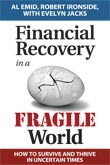Last updated: December 14 2011
Economic News: Bank of Canada Sounds a Warning
Risks to the stability of Canada's financial system are high and have increased markedly in the past six months, says the Governing Council of the Bank of Canada in its December Financial System Review.
If you read the newspapers or watch television, you are well aware that the European sovereign debt crisis threatens global financial stability. And you are no doubt familiar with the risk a global economic downturn presents. But those are just the first of the main risks the Review highlights. The other three are:
- a disorderly resolution of global current account imbalances;
- a prolonged period of low interest rates, which could encourage imprudent risk-taking and/or erode the long-term soundness of some financial institutions; and,
- financial stress in the Canadian household sector.
It is, perhaps, that last one that should cause us some reflection. "In Canada,î states the Bank of Canada, "the elevated levels of household debt and housing prices require continued vigilance and close co-operation among Canadian authorities.î
The Bank of Canada believes the euro zone is already in recession and fears the U.S. could slide into recession as a result of fiscal consolidation and households cutting spending in order to pay down debt. Although Canada is relatively stable, it is vulnerable to global pressures. As Bank of Canada Governor Mark Carney noted in a recent speech, American demand for Canadian exports is already $30 billion less than normal.
The accumulation of debt on the part of advanced economies vs the accumulation of assets on the part of emerging economies further add to shrinking global demand. Historically low interest rates ó which are expected to stay low ó are putting pressure on the returns of institutional investors such as insurance companies and defined-benefit pension plans. The Review notes the funded status of Canadian pension funds is approaching the all-time low reached in 2008. In fact, the Mercer Pension Health Index declined from 71% in the second quarter of 2011 to 64% at the end of October, "indicating that a representative pension plan faces a higher risk of being unable to fully meet its financial obligations.î
Then there is the risk rising household debt presents to Canadian financial stability. The ratio of household debt to assets remains above its pre-crisis level, the Bank of Canada notes, and household net worth, which declined modestly in the second quarter of 2011, is expected to decline further in the third quarter. Canadian households' debt-to-income ratio reached a historical high of 149% in the second quarter, and has surpassed U.S. levels since the beginning of 2011. Household credit is growing at a faster rate than household incomes.
"The rising indebtedness of Canadian households in recent years has increased the possibility that a significant proportion of households would be unable to make debt payments in the event of an adverse economic shock,î the Bank f Canada concludes. "This growing vulnerability has heightened the risk that a deterioration in the credit quality of household loans would amplify the impact of the shock on the financial system.î

